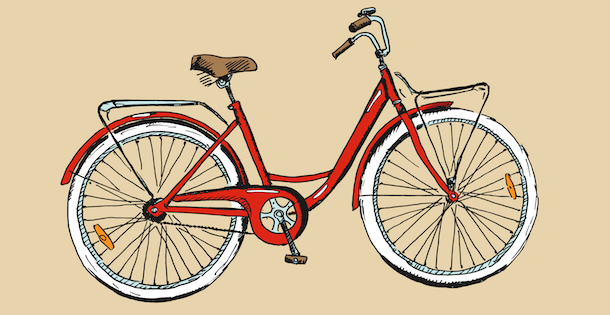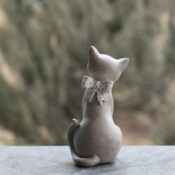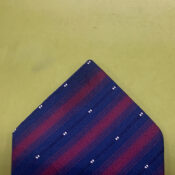Irma Ruger, wearing a white blouse with blue tailored skirt and matching jacket — almost a uniform — entered the classroom among, but not with, a gaggle of other second-grade girls in bright dresses and pinafores.
As Irma demurely took her seat, she was watched intently by Izzy Mahler. Izzy was far from being the only 7-year-old boy with eyes on Irma and her long blonde hair. Andy Shore, for one — Izzy’s nemesis — practically leered at Irma.
Izzy drifted into a daydream, in which Irma Ruger, screaming soundlessly, was dragged into a dark woods by a gang of boys with black masks and hoods, while Izzy came running to save the day, leading his own squad of boy-heroes.
“IZZY!” intruded the contralto rumble of Mrs. Peony Boggs. “Stand up. Face the flag.”
All his classmates were on their feet, hands over their hearts. Izzy jumped up and joined in reciting: “I pledge allegiance … to the flag … of the United States of America … one nation … indivisible … with liberty and justice for all.” George Washington and Abraham Lincoln presided from black-and-white portraits in the lofty front corners of the room.
The students’ bottoms had barely touched their seats when Mrs. Boggs broached a new topic.
“Look at this, boys and girls,” she said, holding up a white paper tag that dangled from a string. It was shaped like a shield and bore the words, “I VOTED — DID YOU?” in red and blue letters.
“There’s an election coming, children —”
“For president!” shouted Andy Shore, bolting to his feet.
“Sit down, Andrew,” said the leathery old teacher. “Yes, for president, among other offices.”
Izzy knew all about the coming election. For weeks he had seen the signs: “I LIKE IKE,” and “MADLY FOR ADLAI.”
“Your parents will be voting — and when they leave the polls, they will each be given one of these tags that they can wear to encourage others to come out and vote as well.”
The children stared blankly at their teacher. Two or three were already squirming in their seats.
“But there’s more!” boomed Mrs. Boggs. “The Jaycees are sponsoring a contest for school children. Just collect these tags on Election Day, from your parents, your relatives, your adult friends and neighbors — and whoever gets the most tags wins this bicycle.” She held aloft a color photo of a cherry-red Schwinn Hornet, a 26″ boys’ model.
Now she had their attention.
Who wouldn’t want that? thought Izzy. He didn’t know what Jaycees were, but if they gave out bikes like this, they must be okay.
His dream of rescuing Irma replayed, with instant edits: Now Izzy arrived on a bright red bike, red-and-white streamers flowing back from its handlebars in the breeze generated by his terrific speed. The bad guys were routed in no time at all, and Irma planted on Izzy’s cheek a sweet, chaste kiss.
After school, Andy Shore, untangling his bike from a hundred others parked at the school’s bicycle racks, called out to Izzy.
“Hey, Izzy!” shouted Andy. “You gonna win the big contest?”
Izzy nodded. “What about you?” he asked.
“Me?” said Andy. “What do I need some contest for, dummy? Already got my English racer.” He struck a pose beside his thin-tired Raleigh, its frame festooned with cables from the hand brakes and shift lever.
“But your dad didn’t get you a bike, did he?” Andy taunted.
“Well,” said Izzy, rather lamely, “he’s waiting till I learn to ride.”
“Hah! See? You couldn’t balance a two-wheeler, even if you had one!”
Izzy fumed as Andy rode off toward his sprawling brick house in Oak Hills. Inwardly he resolved not only that he would win the contest, but that he and his new, cherry-red Schwinn would leave Andy and his English racer in the dust.
In a tidy bungalow on Lundy Street, Irma Ruger sat erect on a low chair while her mother, a lumpy woman in her mid-40s, brushed Irma’s long golden hair.
“I wish I could be more like them, Mutti,” said Irma. “I feel so … different.”
Ilse Ruger, who spoke good but accented English, clucked.
“You are different, Mäuschen. You are German.” She counted the brushstrokes under her breath.
“But why do we have to be German? Why can’t we be American, at least a little?”
“Maybe someday,” said Ilse. “But so far, we are German. And that’s nothing to be ashamed of, whatever anyone may say.”
With one finger, she flicked a small drop of moisture from Irma’s cheek.
“There,” said Ilse. “Einhundertfünfzig. All done.”
She put down the brush, grasped Irma fiercely by her thin shoulders, and stared firmly into her deep blue eyes.
“Remember,” she said, “being German is nothing to be ashamed of.”
Andy Shore zoomed straight toward Izzy on his English racer. At the last moment, he threw his leg over the bar for a trick dismount, and came to a jarring stop practically in Izzy’s face.
“Hey, you Commie!” said Andy. “Why’n’t you get outta the way?”
“I’ve seen you do that before,” said Izzy. “I knew you’d stop. And don’t call me a Commie.” Izzy didn’t know what a Commie was, and he was pretty sure Andy didn’t either, but he didn’t like it.
“You still gonna win that contest?” asked Andy.
“Sure,” said Izzy.
“No you ain’t, ’cause I’m gonna win.”
“I thought you couldn’t be bothered,” said Izzy, dismayed.
“My dad told me it’s wrong not to try, so I’m gonna win it,” Andy explained.
All teachers attended PTA meetings. Most parents also came, and they brought their children with them. The kids played games under a teacher’s supervision in Grant School’s ground-floor gymnasium, while the adults sat on folding chairs in the second-floor rotunda, discussing the children’s education.
Mr. Warner, the principal, in his gray gabardine suit, stood beside bald Harvey Lemming, smiling president of the Jaycees. A large sign mounted on an easel said, “I VOTED — DID YOU?” Beside it stood another easel, with a large photo of the cherry-red Schwinn.
“Whoever collects the most tags — from parents, neighbors, relatives, and friends — will win the bike,” said Principal Warner.
Izzy’s parents, Harold and Alice Mahler, took this news calmly. Nearby, Jack Shore beamed, imagining his Andy awarded the prize and duly photographed by a Speed Graphic from the Daily Times-Press. Jack’s wife, Miriam, wearing a cherry twist hat with a small veil, smiled complacently.
“By the way,” added Harvey Lemming, “do remember to go to the polls November 4 and cast your own vote, to set an example for your children and to add your tags to their totals for the contest!”
In the back row, Ilse Ruger sat stiffly with her husband Heinz, a slim, gray-haired man of near 60, wearing a corduroy jacket of prewar cut. As the Jaycees’ president spoke of bringing tags home from the polls, the Rugers exchanged a rueful glance.
In the gym, girls and boys played table tennis, kicked balls around the floor, or stacked building blocks, depending on their ages.
Second-grade girls jumped in and out of the spinning arc of a rope, while the rope’s twirlers chanted “I had a little puppy, his name was Tiny Tim …” Irma, in skirt, jacket, and blouse, smiled faintly as she watched.
Izzy sidled up and, with all the savoir-faire he could master, poked Irma’s shoulder.
“Hello, Izzy,” said Irma.
“You know that red bike?” said Izzy, in a rush. “Well, I’m going to win it!” This was information he knew Irma needed, so she could rest assured of a speedy rescue, whenever she might happen to be dragged into a dark thicket by a sinister gang in black outfits.
“That’s nice,” said Irma. “I’m happy for you. I wish I could join the contest.”
What a strange thing to say, Izzy thought.
“But you … I mean … I guess you can enter the contest … if you want to.”
“No, Izzy,” said Irma. “My parents can’t vote. They’re from Germany.” She watched his face closely. So far, whenever she mentioned this fact to children her age, she had met blank stares. They didn’t know what “Germany” was, let alone the grim story of war, separation, and hardship that Irma’s little family had endured. Even she didn’t know much about that, having emigrated as an infant; but she knew it was painful and sorrowful, a kind of thing that boys like Izzy and Andy could not know about.
Something, however, dawned in Izzy’s eyes, as if a missing answer had been supplied.
“That must be,” said Izzy, “why you’re so —”
“Strange?” Irma supplied.
“No,” said Izzy, frowning. “I was going to say so … well, beautiful.”
Nobody but her father had ever called Irma beautiful. But this did not alter the facts at hand.
“My parents can’t vote,” she insisted sternly.
“But you can ask other people for their tags, and that counts, too.”
“It does?” said Irma, stunned.
“In came the doctor, in came the nurse, in came the lady with the alligator purse,” chanted the girls on the jump rope, as Irma struggled to absorb the implications of Izzy’s remark.
Izzy trudged LaSalle Street, soliciting voter tags door-to-door. Some residents had not given much thought to the election; these he encouraged to go vote, and bring him the tag. Others, especially older women who were deliberate and unfailing voters, readily agreed to save their tags for Izzy. He gathered pledges of more than 20 tags, not counting those his parents would bring home on November 4.
An Indian summer Saturday brought forth a late-season picnic. Trudy Holmes, a middle-aged widow, Izzy’s mother’s aunt, had a house with a large side yard perfect for family gatherings.
“Somethin’ wrong with the potato salad, Iz?”
Emerging from a fog, Izzy saw that Aunt Trudy had sat down beside him.
“You ain’t touched a thing on your plate. What’s wrong?”
“Uh —”
“’Tain’t the food, is it?”
Izzy stammered, “I was just thinking —”
“About a girl, I expect.”
“How did you know?” asked Izzy, astonished.
Aunt Trudy smiled, and the smile reached the corners of her eyes.
“I’ll bet you don’t know how to get her to notice you,” she said.
“I know it all right,” said Izzy. “I just can’t do it.”
“Do what?” said Aunt Trudy.
“Ride a bike,” Izzy replied. “A two-wheeler.”
“Oh, pshaw! Why didn’t you say so?”
She led Izzy around to her garden shed and dragged out an old black bicycle. She stood it up in front of Izzy.
“Hop on, Iz! I’ll teach you.”
Izzy looked askance.
“It’s a girls’ bike,” he pointed out.
“Don’t matter,” said Aunt Trudy. “A bike’s a bike, they all ride the same way.”
Izzy stood on the pedals while Aunt Trudy held the bike by its handlebars and seat. Grandma and Grandpa LaChance and several uncles and cousins gathered round and looked on with interest.
“I’ll run alongside and hold you up,” Aunt Trudy explained.
“Don’t let go!” shouted Izzy.
“Don’t worry,” said Aunt Trudy. She ran the bike swiftly across the yard, Izzy’s feet flying up and down, pushed by the pedals, which seemed to have a manic will of their own.
Izzy was thrilled by the feel of wind in his face.
“You can let go now!” he shouted recklessly. Receiving no reply, he looked around and saw Aunt Trudy standing 20 feet to the rear, grinning. The wheel jinked to the left, and Izzy fell, heels over handlebars, on the forgiving grass.
“You said you were going to hold on!” he sputtered.
“You did it, Iz!” replied Aunt Trudy. “You turned the pedals 10 times all by yourself!”
Sunday afternoon Izzy stood on the sidewalk near Irma’s house, trying to work up the nerve to ring her bell. He had already mentioned to Irma his impending victory in the Jaycees’ bike contest. Now it only remained to point out the staggering implications, in terms of quick rescue.
Before he could approach the house, the front door opened, and out stepped Andy Shore. He came striding up the walk, a smile on his face.
“Hey there, Commie!” Andy hailed with good cheer as he collected his bike, which had been left at Irma’s front gate.
“Andy!” said Izzy. “What are you doing?”
Andy frowned in puzzlement.
“I mean,” Izzy explained, “what are you doing here?”
“Just leaving,” said Andy. “Irma likes me, you know.” His face glowed with a raffish imitation of trustworthy virtue.
“Hey, are you still working on that bike contest?”
Izzy nodded.
“Kid stuff!” said Andy.
“What do you mean, ‘kid stuff’?”
“I mean I’ve got better things to do, dummy,” said Andy. “If you know what I mean.”
“Uh … not really,” said Izzy.
“Enjoy riding your bike,” said Andy. “I guess a cherry-red Commie bike’s better than nothing … if you can’t have an English racer.”
Why had Andy once again abandoned the contest? Izzy shook his head in confusion as he watched Andy race away. Then he went to Irma’s front door and knocked.
Irma’s mother — an old lady, Izzy saw with surprise — opened the door. Making a great fuss over Izzy, Ilse Ruger led him into the front parlor — one could hardly call it a “living room” with its Victorian settee, doilies everywhere, and fragile-looking knickknacks covering nearly every surface.
She placed Izzy beside Irma on the settee and brought from the kitchen two glasses of milk and a tiny tray of cookies, which she set on the coffee table in front of them.
“So nice of you to come, Izzy,” said Irma, as casually as if she spent part of each day taking tea with lords and ladies.
“Such a nice boy,” echoed Ilse; and she added, in a stage whisper meant for Irma, “Not like dass Lausebengel Andy.” Then she went back to the kitchen.
“What’s a ‘louse-bangle’?” said Izzy.
“Never mind,” said Irma. “Andy’s okay.”
“I guess so,” replied Izzy, dubiously. “But I’m going to win the contest.”
“I wish I had a bike,” said Irma. “Then I’d be more like the other girls.”
Izzy was flabbergasted.
“Why would you want that?” he cried.
“It’s lonely being so different,” she replied. “Anyway, I can’t really win that contest.”
“Why not?” said Izzy. “It doesn’t matter whether your parents can vote or not.”
“Well,” Irma sighed, “I don’t know other people to ask for their tags.”
“Do what I do,” said Izzy. “Just go from one house to the next and ask them.”
Irma stared at Izzy as if he had just arrived from Planet Orkulon to share the secret formula for mogsplortz.
“Oh, I couldn’t do that,” she said. “Not with people I haven’t been introduced to.”
On Tuesday, November 4, Harold and Alice Mahler, Jack and Miriam Shore, and most other townspeople went into curtained voting booths, marked their paper ballots, slipped them through the slot in the top of the ballot box, received their “I Voted — Did You?” tags, and took the tags home for their own children or for those other children who had spoken for them.
As it turned out, more people liked Ike than were smitten madly with Adlai. That was irrelevant to Izzy as he skipped from door to door, collecting his pledged tags.
Students filled the rotunda as Principal Warner and Harvey Lemming prepared to announce the winner. Teachers hushed their pupils, and the principal stepped forward.
“Well, the election is over!” he declared. “General Eisenhower will become President Eisenhower next January 20.”
The children applauded and shouted raucously — not out of partisanship, but simply as an expression of innocent joy on a patriotic occasion. The people had spoken, and the republic would go on.
“And the winner of the Jaycees’ bike contest,” shouted the head Jaycee, “is —”
A loud roll burst forth from the snare drum of sixth-grader Marty Siedentop — a flourish so prolonged that Principal Warner finally stepped across the floor and waved his hands at Marty to put an end to it.
“The winner,” resumed Mr. Lemming, “is … Irma Ruger!”
A moment of stunned silence, then something like a collective gasp rolled through the massed students as Irma stepped up to meet her moment, winning a new Schwinn bicycle — a pink, girls’ model — that was wheeled out by Mrs. Boggs.
As Irma claimed the prize, Izzy’s eyes met those of Andy Shore. Neither was surprised that Irma had won. As Izzy glanced around the room, it was clear that several other boys were also unsurprised.
After school, Irma retrieved her new bike from the racks, where she had parked it immediately after the ceremony. Several other girls gathered around Irma to express their oohs and ahs and to congratulate her on winning the prize.
Izzy, watching from a distance, saw and heard Irma calmly but graciously accept an invitation from Patty Osborne, reigning queen of the second grade, to go riding together later that afternoon.
When the girls had dispersed, Irma climbed on her bike and was about to leave when she saw Izzy watching her.
“Oh! Hi, Izzy!” she said.
“Hello, Irma.”
“Thank you for helping me,” Irma said. “I wouldn’t have this bike if you and some others hadn’t given me your tags.”
“You’re welcome, Irma. I hope you enjoy the bike.”
Irma nodded, put her foot on the pedal, and then looked up again.
“Izzy, you could borrow it sometimes,” she said. “I know you don’t have a bike.”
Izzy gave a small frown as he thought about borrowing Irma’s bike.
“Or …” she said, “I guess you wouldn’t want to ride a girls’ bike.”
Izzy laughed.
“Actually,” he said, “I learned on a girls’ bike, my Aunt Trudy’s. But don’t worry about it, Irma. Now that I know how to ride, I’ll just nag my dad until he buys me one.
“It was more important for you to win this one.”
Irma smiled. On impulse, she leaned forward and kissed Izzy on the cheek. Then she mounted her bike and rode away.
Read more about Izzy Mahler’s adventures in Larry F. Sommers’ “Nickel and Dime.”
Become a Saturday Evening Post member and enjoy unlimited access. Subscribe now



